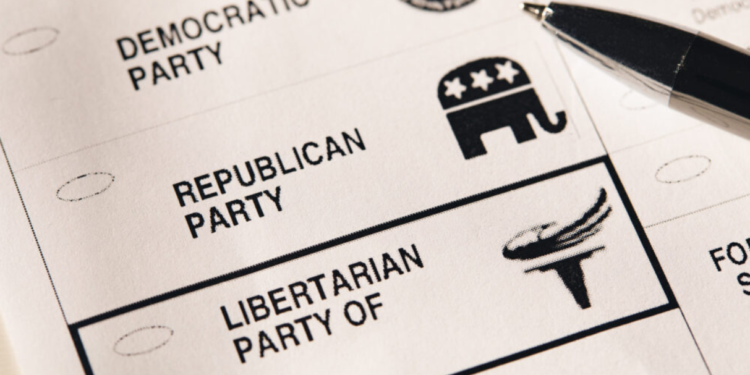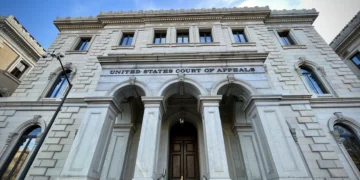Sep 26, 2024 Story by: Editor
The U.S. Court of Appeals for the 11th Circuit will decide whether to uphold a ruling that blocks certain provisions of Georgia’s 2021 election law overhaul, which civil rights groups argue discriminates against Black and disabled voters.
The Georgia Republican Party, along with national GOP political committees, is supporting state officials in their appeal to overturn the August 18 decision made by District Judge J.P. Boulee. Boulee granted preliminary injunctions concerning voting regulations linked to the contentious Senate Bill 202, which was enacted following the 2020 presidential election.
The attorney general’s office filed an appeal with the Atlanta-based circuit court on September 18.
Boulee’s temporary order currently permits the distribution of food and water to voters, provided they remain more than 150 feet away from polling places. Additionally, the ruling invalidates SB 202’s stipulation that absentee ballots with incorrect birth dates on the outer envelope are automatically rejected by the county clerk.
However, Boulee denied the plaintiffs’ request to suspend provisions that limit access to absentee drop boxes and restrict who can assist voters in returning mail-in ballots.
The state is appealing Boulee’s injunction regarding these two rules, which are set to be in effect for the upcoming 2024 election.
On Friday, a full-day evidentiary hearing took place in Boulee’s courtroom, involving attorneys representing both the plaintiffs and defendants.
Special Assistant Attorney General Gene Schaerr argued that the plaintiffs are attempting to rehash old claims that Republican lawmakers were discriminatory when passing legislation they believe enhances the regulation of elections statewide.
“Granting this motion this close to the election would create some confusion and doubt that SB 202 was trying to resolve,” Schaerr argued in court. “The only way you can grant any relief on this motion is for the court to find that the majority in the General Assembly is racist.”
This lawsuit consolidates multiple legal challenges filed after the voting bill was signed into law in 2021.
Among the plaintiffs in Kemp v. Sixth District of the American Methodist Episcopal Church are organizations such as Delta Sigma Theta Sorority, Georgia Muslim Voter Project, and the Georgia Advocacy Office, which advocates for individuals with disabilities.
The state’s attorneys maintain that Georgia has strong voting laws, citing automatic voter registration as an example. They argue that SB 202 established an additional mandatory day of early voting and implemented various safeguards to minimize long wait times for voters. Furthermore, state lawyers assert that the absentee ballot rules are designed to protect election integrity by adding an extra layer of transparency.
Conversely, the groups challenging SB 202 argue that the law is likely to deter Black and disabled voters on Election Day, particularly due to a rule that restricts out-of-precinct voting unless it occurs within two hours of polls closing.
Absentee Drop Boxes Under Scrutiny
Boulee stated in his August 18 order that a complete ban on distributing food and beverages to voters waiting in line could violate the First Amendment.
SB 202 also requires absentee voters to provide their Social Security numbers along with their driver’s licenses or state identification cards.
“The court is simply not persuaded that eliminating the birth date requirement risks introducing fraudulent ballots or threatens election integrity,” Boulee noted in his order last month.
During Friday’s court hearing, Augusta Democratic state Senator Harold Jones, a member of the Senate Ethics Committee that reviews election bills, testified on behalf of the plaintiffs.
Under current regulations, absentee drop boxes must be located inside supervised buildings and are only accessible during early voting hours.
In 2020, state election officials enacted an emergency rule allowing voters to deposit mail-in ballots in containers available around the clock. SB 202 marks the first time absentee drop boxes have become a permanent fixture.
“It was good to require every county to have absentee ballot drop boxes, but there is no reason for us in the Legislature to limit how many a county can provide,” Jones stated.
When asked by a defense attorney whether he believes his Republican colleagues who supported the 2021 election law overhaul were racist, Jones replied that they were attempting to address several nonexistent problems stemming from disappointing results in the 2020 election, where Democratic challengers defeated incumbents Donald Trump and U.S. Senators Kelly Loeffler and David Perdue.
“There was no real issue with absentee ballots until a Democrat who substantially relied on African American (absentee) votes won,” Jones said.
Lawyers from both sides are employing election experts to analyze voter turnout trends since the implementation of the new election law, comparing results from recent elections to those from the previous two statewide elections.
Barry Burden, a political science professor at the University of Wisconsin-Madison who testified for the plaintiffs on Friday, stated that the white voter base in Georgia has declined since the 2014 and 2018 elections. He highlighted the “racial polarization” of elections, where Black voters typically support Democratic candidates by 70% or more, yet socioeconomic disparities between Black and white citizens in Georgia impact their likelihood of voting. According to Burden, new election rules that impose additional obstacles decrease the probability of Black voters exercising their voting rights.
Burden also testified that Black voters in the 2020 and 2022 elections were more inclined to vote absentee and return their ballots through drop boxes. He estimated that the number of drop boxes available in 2022 decreased by about 100, contributing to a 50% drop in usage compared to the 2020 presidential election.
In contrast, the state’s political science expert disputed claims that Black voters utilized drop boxes at a higher rate than white voters in 2022. The defense expert and state election officials also argued that last year’s midterm elections saw record turnout in Georgia. Source: Georgia Recorder

















